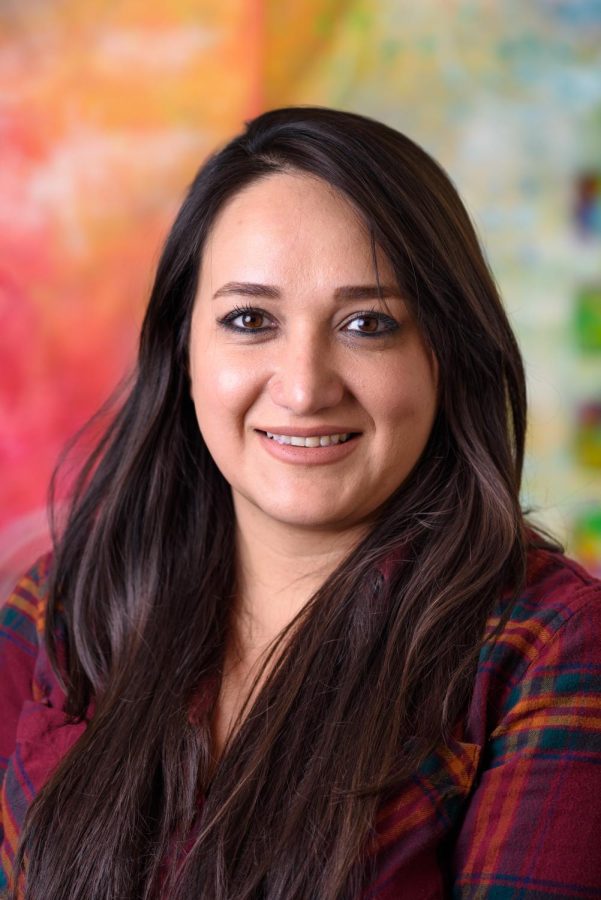Q&A with journalist, teacher and feminist Nazanin Bani Amerian
Nazanin Bani Amerian poses for a photo. Amerian has seen the dangers on being a journalist in Iran and decided to become one herself to make a difference in the world and help those who don’t have access to information. Photo courtesy of Nazanin Bani Amerian.
March 29, 2023
“I am not going to shut up about being a woman,” said communication studies postdoctoral teaching associate Nazanin Bani Amerian. Iranian-born Bani Amerian has always wanted to make a difference.
Many people in Bani Amerian’s home country face backlash for peacefully protesting the government’s enforcement of mandatory hijab for women. The Iranian government has killed at least 500 protesters, according to Iranian human rights activists, and at least 17 female journalists have been detained. Notably, 22-year-old aspiring lawyer Mahsa Amini was beaten to death under Iranian police custody for exposing her hair in September. After Amini’s death, 31 additional journalists were detained and remain imprisoned.
Bani Amerian called Iranian journalists “extraordinarily brave,” as their livelihoods are constantly attacked. She said she also believes in a strong correlation between journalism and activism, feeling that in countries where freedom of speech is threatened and journalism is a dangerous practice, the two are inextricably linked.
In an interview with The News, Bani Amerian discussed her experiences both as an Iranian woman and as a journalist in the United States.
The interview has been edited for length and clarity.
HN: What kind of journalism did you see in Iran and were you influenced to join the journalism field by anything you saw there?
Bani Amerian: Journalists in Iran are extraordinarily brave. To become a journalist in Iran, you never have safety in your job. The government can decide to close your media, your newspaper at any time, and you’re out of [a] job immediately. There is no security in that. There is no freedom of speech. There were lots of journalists in prison because of what they said or what they reported and what they thought. So being a journalist in that part of the world, first of all, you have to love it. They’re very brave, brave women in journalism. Right now we have a couple who got arrested, and in Iran and they’re under lots of pressure. At some point I was going to become an engineer, but then I realized that the problem with society is not that we don’t have good engineers or doctors. We need people in social science in journalism, who care about making a difference, because people know how to do math. People know how to cure sickness, but they don’t have access to information. So that was the thing for me. I wanted to make a difference and change the world.
HN: Do you feel like you have more freedom now that you’re in the U.S. to speak openly about things happening in Iran?
Bani Amerian: You cannot even compare; it’s like zero to 100. It’s still not ideal anywhere in the world, but I think the U.S. is one of the best countries right now for freedom of speech. I can say whatever I want and I’m not scared of being arrested or getting killed or getting kidnapped because of what I think or what I say. But that’s not the case in Iran — in Iran, people have to censor themselves.
HN: Do you feel equal access to education for all women across the world is important? And do you find that a value for yourself?
Bani Amerian: It’s not just for women. Access to education is important for any kind of population that they are suppressing. I think education is the first step to give them all the things like having all those opportunities. We need to give all people who were discriminated against opportunities. If we were in a competition and we were all running, men started running a long time before us. For us to be equal to them, we would have an opportunity to win that game. First of all, we need to fill that gap for the years they didn’t let us start running. That will definitely start with education.
Gender has played a role in my life since I was born. If I’m married in Iran, I cannot have custody of my kids. My husband could ban me from leaving the country any time he wants. I probably worked twice as hard as a man to be where I am. I had to.
HN: Where do you feel journalism meets activism?
Bani Amerian: These are the things that are very correlated. You choose to report on things, to report on them and ask them questions. But with it, this is also very different in other parts of the world because there’s so much going on and there’s so, so many things that you can never say naturally. I think the moment you pick to be a journalist, you pick to become a kind of an activist.







